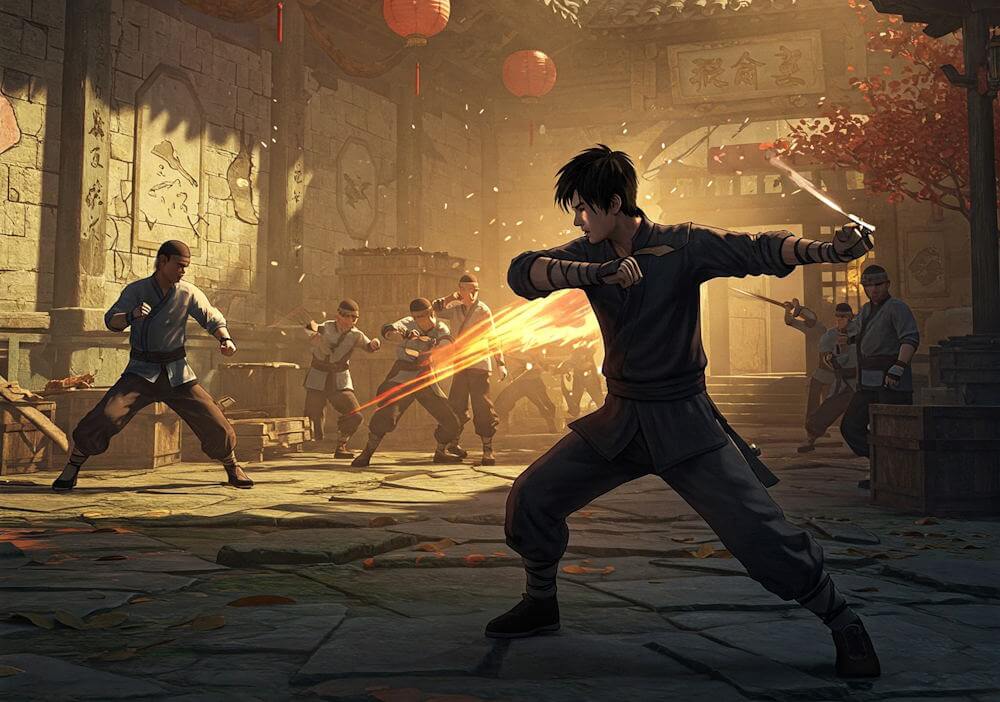‘Sifu’ is an innovative martial arts action game developed by Sloclap, a studio known for its commitment to delivering intense and engaging gameplay experiences. The game stands out in the realm of action titles due to its unique approach to both storytelling and game mechanics. In ‘Sifu’, players are thrust into a journey of vengeance, compelling them to master an array of martial arts techniques to overcome formidable foes. Central to the narrative, the quest for revenge drives the protagonist to hone their skills and confront the adversaries responsible for a tragic event in their life.
One of the most intriguing aspects of ‘Sifu’ is the incorporation of an aging mechanic, which adds a profound layer of depth to the gameplay. As players engage in combat and face various challenges, the character ages each time they fall in battle. This dynamic introduces a fresh strategic element; players must consider the impact of aging on their abilities. While older characters might possess increased skills and experience, they also face limitations that come with age, such as reduced health. This mechanic encourages players to approach each encounter with a blend of caution and aggression, fostering a unique learning experience as they adapt and refine their martial arts techniques.
The game’s design fosters a sense of progression and mastery, allowing players to feel both powerful and vulnerable as they navigate through its richly crafted environments. With a focus on skill development and an evocative narrative, ‘Sifu’ delivers a compelling martial arts experience that challenges players to master every move in their pursuit of vengeance. This blend of intense action and thoughtful mechanics positions ‘Sifu’ as a noteworthy addition to the genre, appealing to both casual gamers and dedicated enthusiasts of martial arts narratives.
Gameplay Mechanics: Mastering Combat
Sifu offers a unique gameplay experience, deeply rooted in traditional martial arts, providing players with an intricate combat system that demands a blend of precision, timing, and strategy. Central to the game is the mastery of various moves and techniques, where each player’s success hinges on their ability to adapt and execute these attacks effectively. The gameplay encourages experimentation with different martial arts styles, allowing players to discover powerful combinations that can be used against a variety of foes.
Timing plays a crucial role in the combat mechanics of Sifu. Players must learn to read their opponents’ movements, anticipating attacks to execute counters or dodges. This focus on timing not only enhances the combat experience but also adds a layer of depth that keeps players engaged. The responsiveness of the controls ensures that every move feels satisfying, from simple punches to more complex grapples, rewarding those who invest time in learning the combat flow.
Additionally, players can utilize their surroundings to gain an upper hand in fights. The environments are designed to interact with the combat system, offering opportunities to use objects as weapons or to create space for strategic maneuvers. This dynamic interaction encourages players to be agile and aware of their environment, emphasizing the immersive experience of a martial arts master in action.
The progression system in Sifu is designed to reward dedication and skill enhancement. As players learn and perfect their techniques, they can unlock new abilities and moves, creating a sense of growth. This feature emphasizes the importance of mastering combat and provides a continuous incentive for players to refine their fighting skills. Sifu not only challenges players to survive but also inspires them to transcend their limits through martial arts practice, truly capturing the essence of mastery.
The Aging Mechanic: A Unique Challenge
Sifu introduces an innovative aging mechanic that fundamentally alters the gameplay experience, setting it apart from traditional action games. In the world of Sifu, players take on the role of a martial artist seeking revenge, facing various foes along their journey. However, a unique twist occurs upon the player’s defeat; each time the protagonist dies, they age one year. This concept introduces a strategic layer that emphasizes the high stakes of combat, compelling players to adapt their approach to each encounter.
As characters age, their combat abilities undergo noteworthy changes. While older characters exhibit increased strength and wisdom, they also become more fragile, diminishing their resilience in battle. This duality creates a delicate balance between risk and reward, where advancing the story can strengthen one’s capabilities, but at the cost of reducing overall durability. This aging mechanic forces players to rethink their strategies with every failed attempt, making each death not just a setback but a pivotal moment of reflection and recalibration.
Additionally, the mechanic promotes a sense of urgency and foresight, as players must weigh the benefits of aggressive tactics against the consequences of potential mortality. As the character ages, players must find ways to harness newfound strengths while compensating for vulnerabilities. This core gameplay loop fosters a mindset of continuous improvement; instead of merely aiming to defeat enemies, players become increasingly focused on mastering skills and techniques, adjusting their playstyle as they age. Overall, Sifu’s aging mechanic enriches the narrative and gameplay elements by making each encounter not just a test of skill but also a lesson in perseverance and strategic planning.
The Story: A Quest for Revenge
Sifu presents a gripping narrative that centers around a lone protagonist who embarks on a perilous journey of revenge following the brutal murder of their family. Set against the backdrop of martial arts, this tale is rich with themes of loss, perseverance, and the quest for redemption, which are expertly interwoven to create a deeply immersive gaming experience. As players navigate this challenging quest, they are constantly reminded of the profound impact that loss can have on one’s life. The protagonist, driven by grief and a desire for vengeance, must confront not only external enemies but also their own inner demons.
The story unfolds through a series of highly stylized confrontations with a group responsible for the protagonist’s tragic fate. Each encounter serves not merely as a combat challenge but also as an emotional testament to the protagonist’s progression and evolution. Through each defeat and subsequent rebirth—thanks to a unique game mechanic that allows players to age and learn from their mistakes—the narrative enforces a powerful metaphor about the cycle of life, death, and awakening. In doing so, it invites players to ponder the essence of perseverance and the human spirit’s capacity to endure, even in the face of overwhelming adversity.
Moreover, the theme of redemption plays a crucial role in enriching the narrative fabric of Sifu. As players advance through the game, they are not simply fueled by a thirst for revenge but also confronted with the possibility of healing and redemption. Each level achieved is a step closer not just to vengeance but to a reconciliation with the past. Thus, the game’s story resonates with players, compelling them to engage with its emotional landscape and showcasing how a quest for revenge can evolve into a more nuanced exploration of oneself and one’s choices. This intricate narrative structure is pivotal, pulling players deeper into the world of Sifu and enhancing their overall experience.
Visuals and Art Style: Aesthetic Appeal
The artistic direction of Sifu exemplifies a profound commitment to blending realism with a distinctive art style that captivates players. The game boasts stunning visuals, characterized by intricate detail and fluid animations that elevate the combat experience. Each character is meticulously designed, showcasing distinct features and styles that reflect their personalities and background, immersing players deeper into the game’s world. The environments, ranging from urban landscapes to serene temples, are crafted with vibrant colors and dynamic lighting, contributing to a visually rich atmosphere that entices exploration.
Sifu’s art style stands out notably due to its integration of stylized combat animations. The developers successfully fuse traditional martial arts aesthetics with modern gaming techniques, resulting in action sequences that are not only engaging but visually spectacular. The fluidity of the animations highlights the characters’ movements, creating a dance-like quality to the fighting sequences that adds depth and artistry to the gameplay. This unique approach allows players to appreciate the skill and precision involved in martial arts, thereby enhancing the overall gaming experience.
Moreover, the game’s aesthetics contribute significantly to its narrative. The visual storytelling is crafted to evoke emotions and build a sense of atmosphere that draws players into Sifu’s compelling world. By utilizing a color palette that shifts in accordance with the game’s mood and intensity, the visuals not only capture attention but also reflect the underlying themes of the game’s journey. The combination of artistic choices and gameplay mechanics culminates in an immersive environment, allowing players to feel part of a living, breathing world, where every move is impactful, and every decision holds weight. The stunning visuals and distinctive art style not only bolster the gameplay but also reinforce the game’s overall narrative and emotional resonance.
Sound and Music: Enhancing the Experience
The sound design and musical score of Sifu play a pivotal role in shaping the overall gaming experience. The game expertly intertwines audio elements with dynamic gameplay to create an atmosphere that heightens emotional connections and storytelling. Traditional instruments and modern soundscapes collaborate to reinforce the game’s themes of martial arts and self-discovery, enveloping players in a world that feels alive and immersive.
The music in Sifu is not merely a backdrop; it is an integral part of the gameplay. Each martial encounter is underscored by a score that adapts to the action, intensifying as players unleash their fighting skills. The employment of traditional Chinese instruments introduces an authentic cultural aspect while serving the dual purpose of grounding the game in its setting. Additionally, the rhythmic beats resonate with the fluidity of combat, accentuating moments of tension and triumph. This dynamic auditory layering allows for an engaging experience, where players feel the weight of each movement and action.
The sound design complements the visual artistry, ensuring that each punch, kick, and block is felt, not just seen. The careful selection of sound effects, from the crack of a fist meeting flesh to the swoosh of a dodged attack, adds a layer of realism that is vital in a game centered around combat. When players strike down an opponent, the corresponding audio feedback offers a satisfying experience, making every fight significant.
Furthermore, moments of quiet between intense battles create a stark contrast, allowing players to reflect and engage with the narrative deeper. In this way, the sound and music of Sifu work symbiotically with gameplay, enriching the player’s journey and making each encounter a memorable one. The combination of traditional and modern audio elements not only enhances the experience but also elevates the storytelling, making Sifu a standout title in the gaming landscape.
Community and Reception: Impact on Players
The reception of Sifu has been markedly positive, with both critics and players acknowledging its unique approach to the action genre. Upon its release, the game was lauded for its intricate combat system and engaging narrative, prompting an influx of discussions within the gaming community. Players have shared diverse experiences, facilitating a vibrant dialogue about mastery and skill progression, which is a core theme in Sifu. This discourse has not only contributed to the game’s success but has also fostered a sense of camaraderie among players striving to improve their skills.
Sifu stands out due to its challenging nature, which has been a double-edged sword for its reception. Some casual gamers have found its steep learning curve daunting, leading to frustrations when attempting to progress. In contrast, hardcore players have embraced these challenges, viewing them as an invitation to refine their techniques. This dichotomy has spurred extensive online conversations about the game’s difficulty, with forums and social media platforms acting as outlets for sharing strategies, tips, and experiences. The notion of “mastering every move or die trying” resonates strongly within these discussions, appealing to those who revel in overcoming obstacles.
Tips and Strategies: Mastering Sifu
For newcomers embarking on their journey in Sifu, mastering the intricacies of the game is essential for success. This requires not only understanding combat techniques but also embracing a mindset that values practice and adaptation. A core principle in Sifu is to become proficient in the timing and execution of moves. Players should familiarize themselves with diverse combat styles and techniques. Each character build offers unique abilities that can be leveraged to create effective strategies against various enemies. Experimenting with different characters will provide insights into how to approach different challenges.
Practice is paramount in Sifu. Players should dedicate time to honing their skills by continually engaging in combat scenarios. This may involve revisiting earlier levels or utilizing training modes to refine techniques. Recognizing that mastering Sifu involves learning from failures is crucial; players should not be discouraged by setbacks. Instead, each defeat serves as an opportunity to analyze mistakes, adjust tactics, and improve overall gameplay. Adopting a reflective approach will enhance a player’s ability to overcome obstacles as they progress through the game.
Additionally, making use of community resources is highly beneficial. Online forums, guides, and videos can provide valuable insights and strategies shared by seasoned players. Joining discussions on platforms such as Reddit or Discord allows players to exchange tips and discuss character builds, unlocking deeper understanding and new techniques. Engaging with the community not only provides practical strategies but also enhances the overall gaming experience. Ultimately, the journey to mastering Sifu is a blend of practice, learning, and community support, paving the way for success in a challenging yet rewarding environment.
Conclusion: The Path of the Martial Artist
In considering the multifaceted themes presented in Sifu, it becomes evident that this game transcends mere entertainment, delivering profound insights into the journey of self-improvement, mastery, and resilience. At its core, Sifu portrays the rigorous and often arduous path of a martial artist, capturing the essence of discipline required to achieve mastery over both physical and mental domains. Each death and rebirth symbolically represents the struggles we all face in real life, reinforcing the idea that setbacks should not deter one from striving toward excellence.
Players are drawn into a rich narrative that echoes the age-old pursuit of personal growth, showcasing how each challenge is an opportunity for learning and development. The relentless nature of the gameplay reinforces the importance of resilience, encouraging individuals to rise after each failure, a fundamental concept in martial arts and life alike. This thematic depth invites players to reflect on their own experiences, illustrating that mastery in any field—be it martial arts or otherwise—requires dedication, patience, and an unwavering spirit.
Moreover, Sifu acts as a metaphor for life’s ongoing journey, where obstacles serve as critical teachers on the road to self-discovery. The game invites both players and observers to recognize that personal development is not linear, and that embracing imperfection is essential for growth. As one navigates through challenges in the game, it parallels the real-world dilemmas individuals face in their endeavors, be it in careers, relationships, or creative pursuits. Ultimately, Sifu encourages a mindset that values perseverance, illustrating that the commitment to continual improvement is the hallmark of true mastery. This perspective enriches the player’s experience, urging them to engage with the principles of resilience and self-betterment long after they have put down the controller.



